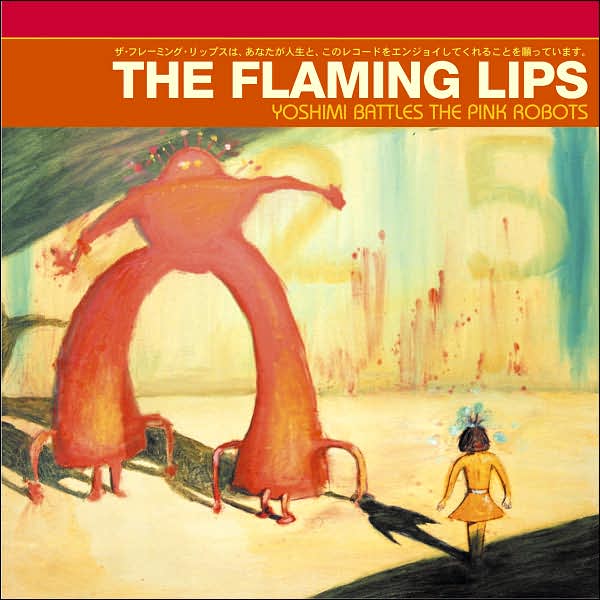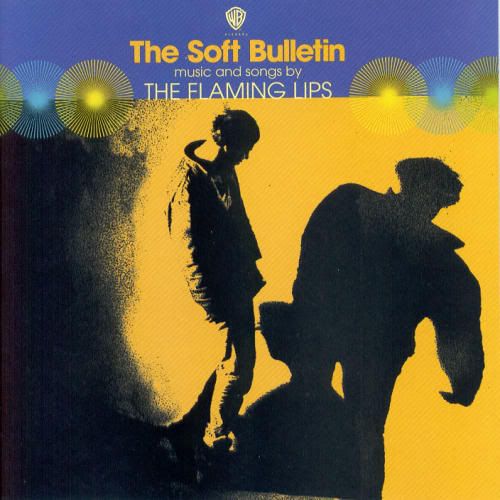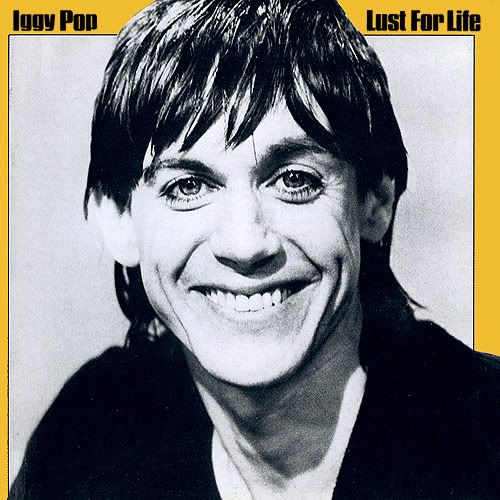
Genre: Psychedelic Rock/Pop
1 Fight Test 4:14
2 One More Robot / Sympathy 3000-21 4:59
3 Yoshimi Battles the Pink Robots pt. 1 4:45
4 Yoshimi Battles the Pink Robots pt. 2 2:57
5 In the Morning of the Magicians 6:18
6 Ego Tripping at the Gates of Hell 4:34
7 Are You a Hypnotist?? 4:44
8 It's Summertime 4:20
9 Do You Realize?? 3:32
10 All We Have Is Now 3:53
11 Approaching Pavonis Mons by Balloon (Utopia Planitia) 3:09
After the symphonic majesty of The Soft Bulletin, the Flaming Lips return with Yoshimi Battles the Pink Robots, a sublime fusion of Bulletin's newfound emotional directness, the old-school playfulness of Transmissions From the Satellite Heart, and, more importantly, exciting new expressions of the group's sentimental, experimental sound. While the album isn't as immediately impressive as the equally brilliant and unfocused Soft Bulletin, it's more consistent, using a palette of rounded, surprisingly emotive basslines; squelchy analog synths; and manicured acoustic guitars to craft songs like "One More Robot/Sympathy 3000-21," a sleekly melancholy tale of robots developing emotions, and "In the Morning of the Magicians," an aptly named electronic art rock epic that sounds like a collaboration between the Moody Blues and Wendy Carlos. Paradoxically, the Lips use simpler arrangements to create more diverse sounds on Yoshimi, spanning the lush, psychedelic reveries of "It's Summertime"; the instrumental "Approaching Pavonis Mons by Balloon"; the dubby "Are You a Hypnotist?"; and the barely organized chaos of "Yoshimi Battles the Pink Robots, Pt. 2," which defeats the evil metal ones with ferocious drums, buzzing synths, and the razor sharp howl of the Boredoms' Yoshimi. Few bands can craft life-affirming songs about potentially depressing subjects (the passage of time, fighting for what you care about, good vs. evil) as the Flaming Lips, and on Yoshimi, they're at the top of their game. "Do You Realize??" is the standout, so immediately gorgeous that it's obvious that it's the single. It's also the most obviously influenced by The Soft Bulletin, but it's even catchier and sadder, sweetening such unavoidable truths like "Do you realize that everyone you know someday will die?" with chimes, clouds of strings, and angelic backing vocals. Yoshimi features some of the sharpest emotional peaks and valleys of any Lips album — the superficially playful "Fight Test" is surprisingly bittersweet, while sad songs like "All We Have Is Now" and "Ego Tripping at the Gates of Hell" are leavened by witty lyrics and production tricks. Funny, beautiful, and moving, Yoshimi Battles the Pink Robots finds the Flaming Lips continuing to grow and challenge themselves in not-so-obvious ways after delivering their obvious masterpiece.
Code: Select all
http://www.sendspace.com/file/wjlcy0

Genre: Psychedelic Rock/Pop
1 Race for the Prize 4:18
2 A Spoonful Weighs a Ton 3:32
3 The Spark That Bled 5:55
4 Slow Motion 3:53
5 What Is the Light 4:05
6 The Observer 4:10
7 Waitin' for a Superman 4:17
8 Suddenly Everything has Changed 3:54
9 The Gash 4:02
10 Feeling Yourself Disintegrate 5:17
11 Sleeping on the Roof 3:10
12 Race for the Prize (Remix) 4:09
13 Waitin' for a Superman (Remix) 4:19
14 Buggin' (Remix) 3:16
I recently moved out of The Box. The Box was where I lived in Seattle for my first year-and-a-half-- a small room in a terrible house. I had an ogre of a next door neighbor named Richard who didn't like any decibel level that went above a whisper. Another neighbor, a homely looking mama's boy of some sort, had weird nasal problems that forced him to make this really loud noise that sounded like a collision between an orgasm, a yawn, a primal howl, and the deafening roar of a tortured honker.
The morning of my move, I checked my e-mail only to discover a rather unfortunate note in my box. A particular woman whose only flaw was in her geographic location (Jerusalem) told me not to come and visit her this summer, and that it was time for her to "get on with her life." I'll translate that: "bang other people without guilt." I saw it coming, but by e-mail? A year and a half of tortured long-distance amore dissolved via Hotmail? By a certain point, you're worth more than e-mail. A phone call. Shit, a letter would have done. No. Not only am I being broken up with, I also have to look at a banner ad for TalkCity.com. Can my life sink any lower?
Last night, I tried to figure out where my life was going. It seems to be on the course where I'm just thinking about where my life is (or isn't) going. Great. Wake me when it gets exciting.
Well, today, it got exciting. I was at work for about six hours when I decided to call my old number and retrieve my messages. There was my temp agency telling me not to go into work today. I guess the object was for me to find out before I left for work (it was 7:30 when they called), but instead, there I was working when and where I shouldn't have been. I called the agency and they said they'd call me back. I sat at my desk awkwardly. Should I be working? If so, why? If not, what should I be doing? I tracked down my supervisor who gave me two reasons for my termination. One was that the workload had dropped and they didn't need that many people. The second reason, of course, was that five people had commented to him that I didn't seem to love my job.
Well, duh. Sorry to go monosyllabic, but... well, duh. I sit at a desk. There's some asshole who insists on whistling all day, and man cannot live by headphones alone. Even today, before I found out I was already yesterday's employee, I commented to a co-worker, "Pretty soon, I'm gonna stab that guy in the throat." Of course, I wouldn't do that. But sometimes, I think that's my big misgiving in life-- no follow through. "I don't hate my job," I told my supervisor. This was true. Boring? Yes. Hate? No. This was going to be the job that gave me enough money to go on a vacation this fall.
"Well, I noticed it, too," he said. "If five people see it and I do, too, then doesn't that tell you something?"
"Did you ever think of asking me?" I asked.
Of course, there wasn't a good answer for that, so I immediately shifted gears. "Hey, if five people came and told you that I was practicing black magic, would you believe them?"
"That's completely different." When I asked him why it was different, he changed the subject to me leaving.
And that was that. To top all of this shit off, I was supposed to interview Wayne Coyne of The Flaming Lips tonight. It didn't happen because my new roommate isn't a stickler for paying the long distance bill. I can see Mr. Coyne sitting by that phone wondering when I'm gonna call. That's a lie, by the way. Wayne has better things to do, and if I had just recorded the Album of the Year, I wouldn't care what anybody else thought.
That's right kids. Album of the Year. The Flaming Lips. Who knew? Sure, they had some great albums like Transmissions from the Satellite Heart and Hit to Death in the Future Head. They also had Zaireeka, a piece of shit. (And stop with the hate mail, already!) This time, no fat, no filler, no shit. This is one of those albums people are going to obsess over for many years to come. One of the only albums I can compare it to is Dark Side of the Moon-- a sonic exploration into a bunch of morbid themes that sound extra good when you've been kissing Ol' Lady Bong.
A big key to the success of The Soft Bulletin is producer Dave Fridmann. Fridmann's an aural genius who did wonders with his band Mercury Rev's last album, Deserter's Songs. As great as that album was, this is a bigger, bolder leap. Sure, the moment you hear the strings on the second cut, "A Spoonful Weighs a Ton", you're thinking 'bout the Rev. That's only half the battle, though:
The song alternates between pixie dust and angel dust-- first it flows, then it swaggers with a killer Moog-and-drum battle with the audience going Qui-Gon at the altar of the Bulletin. The following cut, "The Spark That Bled", is even more adventurous. Coyne's little boy vocals take on a philharmonic of yearning, tackling it down with its ambiguous "I stood up and I said 'Yeah'" chorus. 4AD used to be this dreamy-- now they're picking at leftover Red House Painters demos and wondering when people are going to like Kristin Hersh. (Never, by the way.) This is on Warner Brothers?!
Oh, but there's more. So much more. Drummer Steven Drozd gets mad props for his thundering percussion which, for the most part, was recorded on one microphone. Hard to believe during a dense number like my personal favorite track, "The Gash". As much as I giggled over the title, I was bowled over by the song. A gospel choir sings an inspirational (!) song of perseverance over tweaked synth tracks and louder-than-Christ funky drumming. I defy you to listen to it without seeing just how loud your stereo can get.
Drozd also makes quick work of "Waitin' for a Superman", another inspirational piece-- one that was inspired by the death of Coyne's father. The result is this band's "Losing My Religion". Seriously. If Top 40 gets ahold of this song, we're all going to be very, very sick of it. Still, it's an amazing track, a shuffling dirge with a few bells, and two amazingly well-placed trumpet blasts, but mostly just some slightly hungover piano.
Speaking of death, it's a lingering theme on The Soft Bulletin. "Suddenly Everything Has Changed" is a neat, twisty little ditty about how thoughts of mortality can attack you when you least expect it. "Feeling Yourself Disintegrate" is a more direct rumination on the subject, a dreamy blast of vacuum cleaner guitar and reverb, reverb, reverb! Again, hardly party music, but remember Dark Side of the Moon? Pass the bong. This is some good shit.
Code: Select all
http://www.sendspace.com/file/dhd82q
you just never know when you're living in a golden age.














